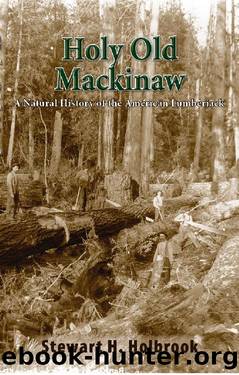Holy Old Mackinaw by Stewart H. Holbrook

Author:Stewart H. Holbrook [Holbrook, Stewart H.]
Language: eng
Format: epub
Tags: HISTORY / HIS054000 - Social History, HISTORY / United States / State & Local / HIS036110 - Pacific Northwest (OR
ISBN: 9781941890073
Publisher: Epicenter Press
Published: 2016-06-01T07:00:00+00:00
Death in Hinckley
Hard work, and rum, women, and what they called âsongâ wasnât all that occupied lumberjacks of the Lake States. Sometimes they had forest fire. It struck worst, perhaps, in 1871. On the dim morning of October 8, that year, one John Mulligan, ex-pugilist who was a logging camp foreman for I. Stephenson & Company, rode a singed and bedraggled horse into the small town of Menominee, Michigan. âThe whole town of Peshtigo has been wiped out,â he said. âNot a soul remains.â
Mulligan didnât exaggerate much. The booming young lumber city of Peshtigo, in near-by Wisconsin, had been wiped out by forest fire that swept in so quickly from the surrounding timber that eleven hundred persons were cremated.
Relief was rushed from near-by towns for distribution at Menominee, and a scene remained long in the eyes of a lumberjack. He saw smoke so thick over Lake Michiganâs Green Bay that two men were posted on the dock at Menominee, lifting and dropping heavy planks to serve as a signal of port to smoke-bound relief steamers.
Rescue crews found little to do, for the fire had been thorough. They did find old John Leach, logger-settler, sitting disconsolately on a warm rock, smoking his pipe. Inside twenty-four hours he had buried eleven children and grandchildren. John Leach was a sample survivor.
As a relief party moved over the hot and smoking ground, Isaac Stephenson marveled to see to what small compass the bodies of big lumberjacks could be brought by the heat of a million pine trees burning. âNothing remained,â he recalled, âother than a mere streak of ashes that would scarce fill a thimble.â
Yet the Peshtigo holocaust received little attention. The great city of Chicago, down at the other end of the lake, was being consumed by fire at almost the same time. Americans like their disasters to be big, and the magnitude of Chicagoâs fire shadowed the horror in the Wisconsin backwoods. Reporters flocked to Chicago to make Mrs. OâLearyâs cow famous and they missed a true reportersâ incident near Peshtigo when, six days after the flames had burned themselves out, a body crashed heavily to the ground from high in a tree. It was that of a young camp foreman, much sought since the fire, who had either forgotten his woods lore or preferred death on a pyre to death on the ground. The body was the last of the Peshtigo victims.
Today, in 1938, not a hundredth part of Wisconsinâs citizenry ever heard of the Peshtigo fire. Old lumberjacks know of it, however, for bunkhouse historians have passed it down to classes around barrel stoves. They tell that the Peshtigo fire bred a thousand moose birds overnight.45
It was a bit different, later at Hinckley. No Chicago fire got in the way.
There was little of dawn about the morning of September 1, 1891, in the woods of Eastern Minnesota. The clock in the sawmill and logging office of the Brennan Lumber Company at Hinckley indicated the time to be eight oâclock. But nothing else did; it was all sort of graylike, neither day nor night.
Download
This site does not store any files on its server. We only index and link to content provided by other sites. Please contact the content providers to delete copyright contents if any and email us, we'll remove relevant links or contents immediately.
| Africa | Americas |
| Arctic & Antarctica | Asia |
| Australia & Oceania | Europe |
| Middle East | Russia |
| United States | World |
| Ancient Civilizations | Military |
| Historical Study & Educational Resources |
Machine Learning at Scale with H2O by Gregory Keys | David Whiting(4296)
Never by Ken Follett(3937)
Fairy Tale by Stephen King(3370)
Oathbringer (The Stormlight Archive, Book 3) by Brandon Sanderson(3161)
The Man Who Died Twice by Richard Osman(3072)
Will by Will Smith(2911)
Rationality by Steven Pinker(2352)
Can't Hurt Me: Master Your Mind and Defy the Odds - Clean Edition by David Goggins(2324)
The Dark Hours by Michael Connelly(2300)
Friends, Lovers, and the Big Terrible Thing by Matthew Perry(2219)
The Dawn of Everything: A New History of Humanity by David Graeber & David Wengrow(2197)
Principles for Dealing With the Changing World Order: Why Nations Succeed and Fail by Ray Dalio(2043)
A Short History of War by Jeremy Black(1843)
HBR's 10 Must Reads 2022 by Harvard Business Review(1840)
Go Tell the Bees That I Am Gone by Diana Gabaldon(1754)
A Game of Thrones (The Illustrated Edition) by George R. R. Martin(1725)
Kingdom of Ash by Maas Sarah J(1668)
515945210 by Unknown(1662)
443319537 by Unknown(1546)
